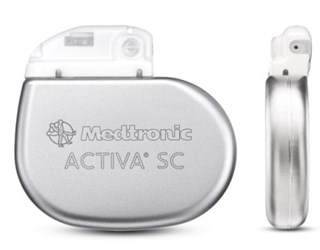Medtronic's DBS Devices Safe For Full Body MRIs, Says FDA

Medtronic has announced that systems within its Activa portfolio of deep brain stimulation (DBS) devices are the first on the market FDA-approved for conditional use with full-body magnetic resonance imaging (MRIs). A spokesman for Medtronic said greater access to MRI diagnostics — which can be critical for patients — has become an important part of developing next-generation Medtronic devices.
Unlike x-rays and CAT scans that use radiation to generate diagnostic images, MRI uses magnetic fields and radio wave energy — a process deemed safer overall, but that safety could be compromised if a patient is implanted with a metal device. An FDA draft guidance released in June indicates that even passive medical devices, such as orthopedic implants, are susceptible to radiofrequency heating and should be labeled accordingly.
DBS is prescribed for patients who suffer from tremors related to multiple sclerosis, Parkinson’s, or dystonia; it acts like a pacemaker for the brain and has been shown to relieve movement symptoms associated with these diseases. Medtronic estimates that seven out of 10 DBS patients may need an MRI within 10 years of implantation and many have lacked safe access to the diagnostic test.
Michael Okun, the national medical director of the National Parkinson’s Foundation, remarked in a press release that full-body MRI access is a “critical unmet need” for DBS patients, but he emphasized Medtronic’s recent approval came with conditions.
“There will be important guidelines for centers to follow in order to apply MRI imaging in patients, however, the availability of this type of imaging is an important step that will facilitate a more optimal care experience,” said Okun.
In order to establish its DBS system’s safety within an MRI machine, Medtronic designed a study which ran 10 million simulated scans that covered 38,000 unique implant conditions.
In the past, safety regulations have required Medtronic’s DBS systems to be turned off and the MRIs tuned at a low radio-frequency power limit, but this new approval will allow — under certain conditions — for the DBS system to continue delivering therapy throughout the MRI.
Lothar Krinke, VP and GM of the Brain Modulation business at Medtronic, remarked that his company has 14 years’ experience in MRI testing and is committed to expanding access to MRIs to patients using Medtronic devices, including pacemakers, ICDs, and spinal cord stimulators (SCS). Both the Evera MRI ICD and Advisa MRI pacemaker were designed for conditional full-body MRI use.
St. Jude Medical recently announced that its Protégé SCS system was FDA approved for MR-conditional labeling, an industry first for SCS systems.
In 2013, the U.S. healthcare system performed an estimated 33 million MRIs, which are used to diagnose conditions such as stroke, spinal cord injury, movement disorders, cardiac conditions, cancer, and dementia.
Medtronic’s website provides a comprehensive resource and list of guidelines for healthcare providers considering MRIs for patients fitted with Medtronic devices.
